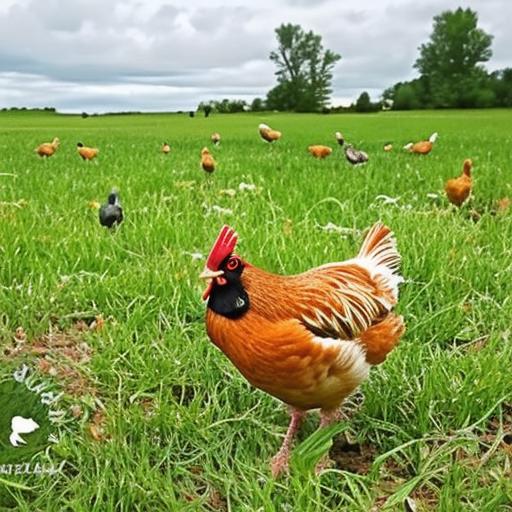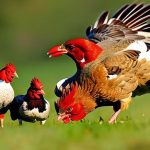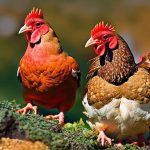Backyard chicken keeping has become increasingly popular in Wisconsin in recent years. More and more people are realizing the benefits of raising their own chickens for eggs and meat, as well as the joy and satisfaction that comes with caring for these feathered friends. However, before embarking on this journey, it is important to understand the laws and regulations surrounding chicken keeping in Wisconsin. By following these rules, you can ensure the well-being of your chickens and maintain a positive relationship with your neighbors and community.
Key Takeaways
- Understanding laws and regulations is crucial for keeping chickens in Wisconsin
- Choose chicken breeds that can thrive in Wisconsin’s climate and environment
- A suitable coop and run are necessary for keeping chickens in Wisconsin
- Feeding and caring for chickens require adjustments in Wisconsin’s changing seasons
- Protecting chickens from predators is essential in Wisconsin
Understanding the laws and regulations for keeping chickens in Wisconsin
In Wisconsin, the laws and regulations regarding backyard chicken keeping vary from city to city and even within different neighborhoods. It is crucial to familiarize yourself with the specific rules in your area before bringing home your feathered friends. Some common regulations include restrictions on the number of chickens allowed, requirements for coop size and placement, and guidelines for waste management.
Following these rules is not only important for legal compliance, but also for the health and safety of your chickens. By providing them with a suitable living environment, you can prevent disease outbreaks and ensure their overall well-being. Additionally, adhering to the regulations helps maintain a positive relationship with your neighbors, as it reduces the chances of noise complaints or other issues that may arise from improper chicken keeping practices.
To learn more about the laws and regulations in your specific area, it is recommended to contact your local government or zoning department. They will be able to provide you with the most up-to-date information and answer any questions you may have. There are also online resources available, such as the Wisconsin Department of Agriculture, Trade and Consumer Protection website, which provides information on poultry regulations in the state.
Choosing the right breed of chickens for Wisconsin’s climate and environment
When it comes to choosing the right breed of chickens for Wisconsin’s climate and environment, there are several factors to consider. First and foremost, you want to select breeds that are well-suited to the cold winters and hot summers that Wisconsin experiences. Cold-hardy breeds, such as the Rhode Island Red, Plymouth Rock, and Wyandotte, are popular choices for Wisconsin chicken keepers.
In addition to climate considerations, you may also want to think about the purpose of keeping chickens. If you are primarily interested in egg production, breeds such as the Leghorn or Sussex are known for their high egg-laying capabilities. On the other hand, if you are looking for chickens for meat production, breeds like the Cornish Cross or Freedom Ranger may be more suitable.
Finding chickens in Wisconsin is relatively easy, as there are many local hatcheries and breeders that offer a wide variety of breeds. You can also consider adopting chickens from local rescue organizations or networking with other chicken keepers in your area. It is important to ensure that the chickens you bring home are healthy and free from any diseases or parasites.
Preparing a suitable coop and run for your chickens in Wisconsin
A suitable coop and run are essential for the well-being of your chickens in Wisconsin. The coop should provide protection from predators and the elements, while also offering enough space for the chickens to move around comfortably. The run should be securely fenced to prevent escapes and keep predators out.
When it comes to building or buying a coop and run, there are several tips to keep in mind. First, make sure the coop is well-insulated to protect against the cold winters in Wisconsin. Adding extra insulation and using materials such as straw or hay can help keep the chickens warm during the winter months. Additionally, provide adequate ventilation to prevent moisture buildup and ensure good air circulation.
For the run, it is important to use sturdy fencing materials that can withstand attempts by predators to break in. Chicken wire is not recommended, as it can easily be chewed through by predators such as raccoons or foxes. Instead, opt for hardware cloth or welded wire mesh with small openings to keep predators out.
There are many resources available for more information on building or buying a suitable coop and run. Online forums and websites dedicated to backyard chicken keeping often have detailed guides and plans for coop construction. Local farm supply stores or agricultural extension offices may also offer workshops or classes on coop building.
Feeding and caring for chickens in Wisconsin’s changing seasons
Wisconsin experiences distinct seasonal changes, with cold winters and hot summers. It is important to adjust your chicken care routine accordingly to ensure the health and well-being of your flock.
In the winter, it is crucial to provide your chickens with adequate shelter and protection from the cold. Make sure the coop is well-insulated and draft-free, and consider using a heat source such as a heat lamp or heated waterer to prevent freezing. Additionally, provide extra bedding in the coop to help insulate against the cold ground.
During the summer months, it is important to provide shade and plenty of fresh water for your chickens. Consider providing a shaded area in the run or using tarps or umbrellas to create shade. It is also important to monitor your chickens for signs of heat stress, such as panting or lethargy, and take steps to cool them down if necessary.
Feeding your chickens a balanced diet is important year-round, but their nutritional needs may vary depending on the season. In the winter, when foraging opportunities are limited, it may be necessary to supplement their diet with additional feed. In the summer, when insects and vegetation are more abundant, you can reduce their feed intake and allow them to forage more.
There are many resources available for more information on feeding and caring for chickens in Wisconsin’s changing seasons. Local agricultural extension offices or poultry clubs may offer workshops or classes on seasonal chicken care. Online forums and websites dedicated to backyard chicken keeping also provide valuable information and tips.
Protecting your chickens from predators in Wisconsin

Wisconsin is home to a variety of predators that pose a threat to backyard chickens. Common predators include raccoons, foxes, coyotes, hawks, and owls. It is important to take steps to protect your chickens from these predators to ensure their safety.
One of the most effective ways to protect your chickens is to provide a secure coop and run. As mentioned earlier, use sturdy fencing materials such as hardware cloth or welded wire mesh with small openings to prevent predators from gaining access. Additionally, reinforce the coop with predator-proof locks and latches to prevent break-ins.
Another important step is to provide adequate lighting around the coop and run. Predators are less likely to approach if there is sufficient lighting, as they prefer to hunt in darkness. Motion-activated lights or solar-powered lights can be effective deterrents.
It is also important to be vigilant and regularly inspect the coop and run for any signs of damage or potential entry points for predators. Repair any holes or weak spots immediately to prevent predators from gaining access.
There are many resources available for more information on protecting your chickens from predators in Wisconsin. Local agricultural extension offices or wildlife management agencies may offer workshops or classes on predator control. Online forums and websites dedicated to backyard chicken keeping also provide valuable information and tips.
Health and hygiene considerations for keeping chickens in Wisconsin
Maintaining good health and hygiene practices is crucial for keeping chickens in Wisconsin. Chickens are susceptible to a variety of health issues, including respiratory infections, parasites, and nutritional deficiencies. By implementing proper health and hygiene practices, you can prevent these issues and ensure the overall well-being of your flock.
Regularly inspecting your chickens for any signs of illness or injury is important. Look for symptoms such as coughing, sneezing, lethargy, or changes in appetite or behavior. If you notice any abnormalities, it is important to seek veterinary care as soon as possible.
In addition to regular health checks, it is important to maintain good hygiene in the coop and run. Clean the coop regularly, removing any soiled bedding or droppings. Provide fresh bedding and nesting material to keep the coop clean and dry. Regularly clean and disinfect waterers and feeders to prevent the spread of bacteria or parasites.
Proper nutrition is also essential for maintaining good health in chickens. Provide a balanced diet that includes a mix of commercial feed, fresh fruits and vegetables, and access to foraging opportunities. Consult with a poultry nutritionist or veterinarian to ensure that your chickens are receiving the necessary nutrients for optimal health.
There are many resources available for more information on maintaining good health and hygiene in chickens. Local agricultural extension offices or poultry clubs may offer workshops or classes on chicken health and hygiene. Online forums and websites dedicated to backyard chicken keeping also provide valuable information and tips.
Integrating chickens into your backyard or homestead in Wisconsin
Integrating chickens into your backyard or homestead in Wisconsin can have numerous benefits. Chickens provide natural pest control by eating insects and other pests, reducing the need for chemical pesticides. They also produce nutrient-rich fertilizer that can be used to improve soil fertility in gardens or on crops.
When integrating chickens with other animals and plants, it is important to consider their compatibility. Chickens can coexist with many other animals, such as goats, rabbits, or bees, as long as proper precautions are taken. For example, provide separate housing or fencing to prevent conflicts between different species.
Chickens can also be integrated into gardens or permaculture systems. They can help control weeds by scratching and pecking at the ground, and their manure can be used as fertilizer for plants. However, it is important to protect sensitive plants from being damaged by the chickens. Use fencing or other barriers to keep the chickens out of areas where they are not wanted.
There are many resources available for more information on integrating chickens into your backyard or homestead in Wisconsin. Local agricultural extension offices or permaculture organizations may offer workshops or classes on integrating chickens with other animals and plants. Online forums and websites dedicated to backyard chicken keeping also provide valuable information and tips.
Benefits of keeping chickens in Wisconsin for eggs and meat production
Keeping chickens in Wisconsin for eggs and meat production has numerous benefits. One of the main advantages is having a constant supply of fresh, nutritious eggs. Eggs from backyard chickens are often considered to be superior in taste and quality compared to store-bought eggs. Additionally, raising your own chickens for meat allows you to have control over the quality and source of your food.
Chickens are also relatively low-maintenance animals, making them a suitable choice for beginners or those with limited space. They require minimal space and can be easily cared for with basic supplies such as feed, water, and shelter. Additionally, they provide entertainment and companionship, as they have unique personalities and behaviors.
To maximize egg and meat production, it is important to provide your chickens with a balanced diet, proper housing, and regular veterinary care. Consult with a poultry nutritionist or veterinarian to ensure that your chickens are receiving the necessary nutrients for optimal production.
There are many resources available for more information on maximizing egg and meat production in chickens. Local agricultural extension offices or poultry clubs may offer workshops or classes on poultry production. Online forums and websites dedicated to backyard chicken keeping also provide valuable information and tips.
Connecting with the Wisconsin backyard chicken community
Connecting with the Wisconsin backyard chicken community can be a valuable resource for new and experienced chicken keepers alike. The community provides a platform for sharing knowledge, experiences, and resources related to chicken keeping in Wisconsin.
One way to connect with the community is to join local poultry clubs or organizations. These groups often hold meetings, workshops, or events where you can meet other chicken keepers and learn from their experiences. They may also have online forums or social media groups where you can ask questions and seek advice.
Attending local poultry shows or fairs is another way to connect with the community. These events provide an opportunity to see different breeds of chickens, learn about best practices in chicken keeping, and network with other enthusiasts.
There are also online resources available for connecting with the Wisconsin backyard chicken community. Online forums and social media groups dedicated to backyard chicken keeping often have members from all over the state who are willing to share their knowledge and experiences.
Tips for successfully keeping chickens in Wisconsin, even as a beginner
Keeping chickens in Wisconsin can be a rewarding experience, even for beginners. Here are some tips to help you get started:
1. Start small: Begin with a small flock of chickens to gain experience and ensure that you can properly care for them.
2. Research and educate yourself: Take the time to learn about chicken care, laws and regulations, and best practices before bringing home your chickens.
3. Provide proper housing: Invest in a suitable coop and run that provides protection from predators and the elements.
4. Feed a balanced diet: Provide your chickens with a balanced diet that includes commercial feed, fresh fruits and vegetables, and access to foraging opportunities.
5. Monitor for signs of illness: Regularly inspect your chickens for any signs of illness or injury, and seek veterinary care if necessary.
6. Practice good hygiene: Keep the coop and run clean and provide fresh bedding and nesting material regularly.
7. Connect with the community: Join local poultry clubs or organizations, attend events or shows, and participate in online forums or social media groups to connect with other chicken keepers.
In conclusion, backyard chicken keeping in Wisconsin has become increasingly popular, and for good reason. By understanding the laws and regulations, choosing the right breed, preparing a suitable coop and run, feeding and caring for chickens, protecting them from predators, maintaining good health and hygiene, integrating them into your backyard or homestead, and connecting with the Wisconsin backyard chicken community, you can embark on a successful chicken keeping journey. Whether you are interested in eggs, meat, or simply the joy of caring for these feathered friends, keeping chickens in Wisconsin can be a rewarding and fulfilling experience. So why not start your own backyard chicken journey today?
If you’re wondering about keeping chickens in Wisconsin, you’ll definitely want to check out this informative article on chicken coop door size. It’s an essential aspect of creating a safe and comfortable environment for your feathered friends. Learn about the ideal dimensions and considerations for chicken coop doors, ensuring easy access for both chickens and their caretakers. Discover more helpful tips and tricks for raising chickens in Wisconsin by visiting poultrywizard.com.
FAQs
What are the laws regarding keeping chickens in Wisconsin?
Wisconsin state law allows residents to keep chickens in urban and suburban areas, but local ordinances may have specific regulations and restrictions.
How many chickens can I keep in Wisconsin?
The number of chickens you can keep in Wisconsin varies depending on the local ordinances. Some cities allow up to 10 chickens, while others may have a limit of 4 or 6.
Do I need a permit to keep chickens in Wisconsin?
Most cities in Wisconsin do not require a permit to keep chickens, but it is important to check with your local government to see if there are any specific regulations or requirements.
What kind of housing do I need for my chickens in Wisconsin?
Chickens in Wisconsin need a secure and ventilated coop that protects them from predators and extreme weather conditions. The coop should also have a nesting area and roosting space.
What kind of food do chickens need in Wisconsin?
Chickens in Wisconsin need a balanced diet that includes grains, protein, and fresh water. They can also eat fruits, vegetables, and insects.
Do I need to provide medical care for my chickens in Wisconsin?
While chickens in Wisconsin do not require regular medical care, it is important to monitor their health and seek veterinary care if they show signs of illness or injury.
What are the benefits of keeping chickens in Wisconsin?
Keeping chickens in Wisconsin can provide a source of fresh eggs, natural pest control, and fertilizer for gardens. It can also be a fun and educational hobby for families and individuals.
Meet Walter, the feathered-friend fanatic of Florida! Nestled in the sunshine state, Walter struts through life with his feathered companions, clucking his way to happiness. With a coop that’s fancier than a five-star hotel, he’s the Don Juan of the chicken world. When he’s not teaching his hens to do the cha-cha, you’ll find him in a heated debate with his prized rooster, Sir Clucks-a-Lot. Walter’s poultry passion is no yolk; he’s the sunny-side-up guy you never knew you needed in your flock of friends!







